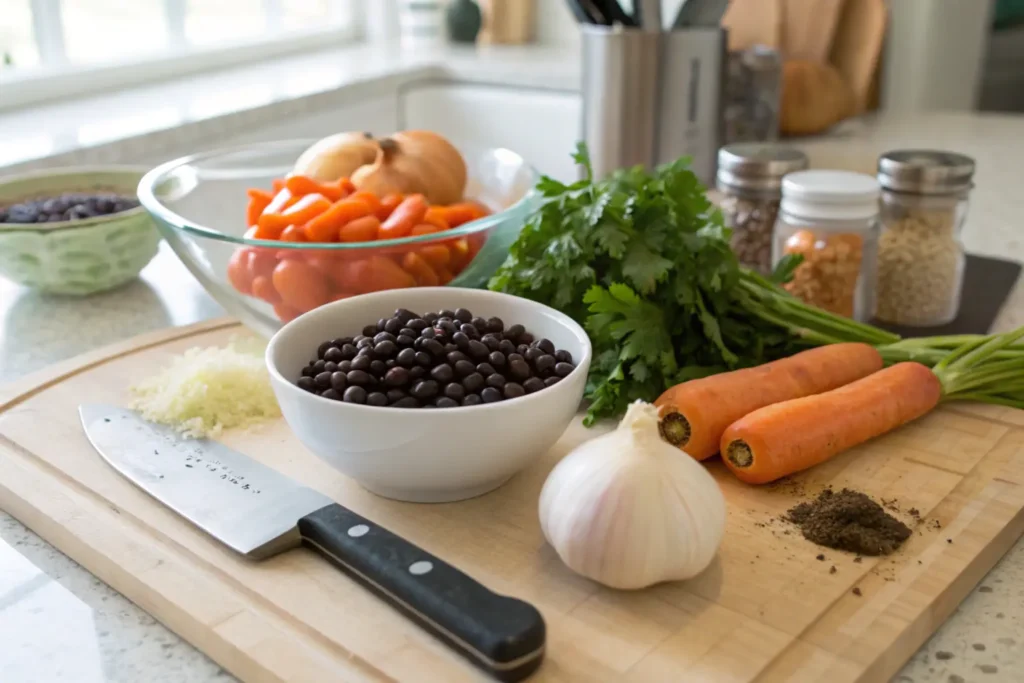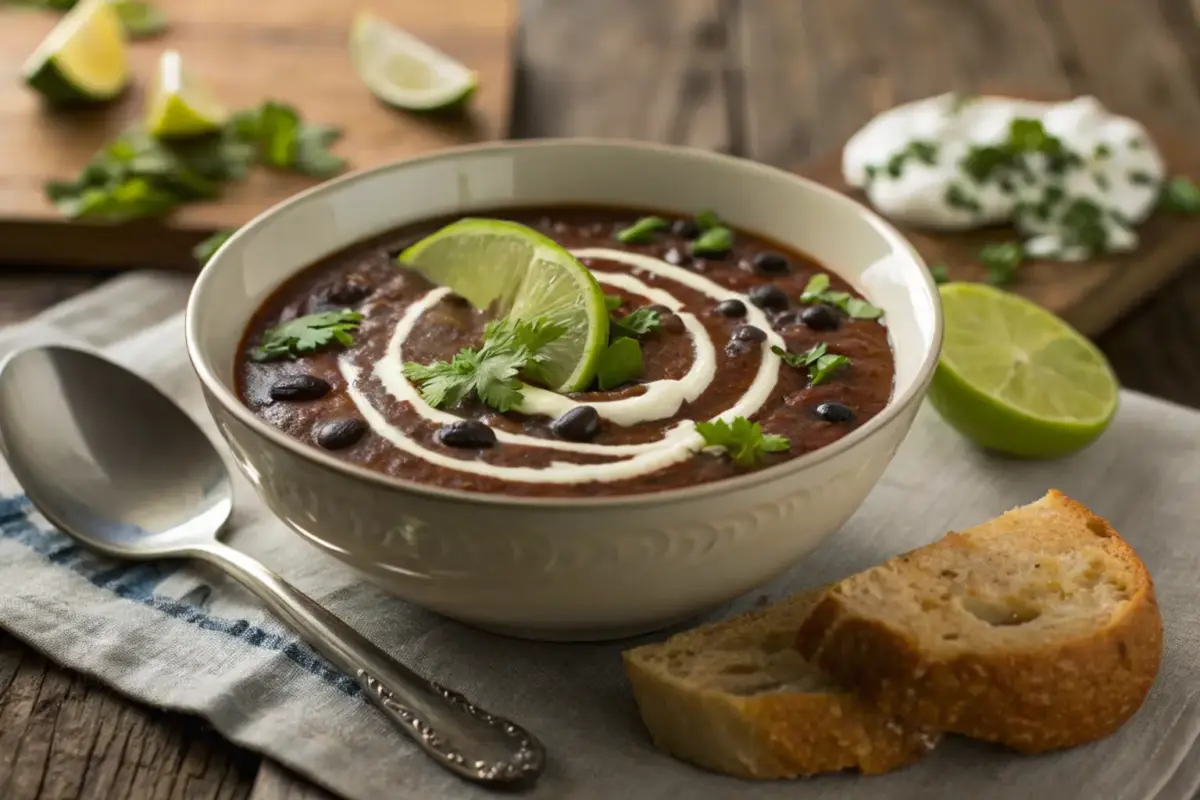Introduction and Causes of Bitterness
Understanding the Common Issue with Black Bean Soup Flavor
Black bean soup is a beloved dish enjoyed for its rich texture and earthy flavor. However, a bitter taste can ruin its appeal, leaving diners disappointed. This common issue often stems from avoidable mistakes during preparation or cooking. If you’ve ever wondered, “How do you get rid of the bitter taste in black bean soup?”, you’re not alone. Many home cooks face this challenge and seek effective solutions to fix and prevent bitterness.
The reasons for bitterness vary, but it frequently results from improper ingredient handling or cooking methods. Addressing this issue is critical to crafting a delicious soup that pleases the palate. This guide will walk you through the underlying causes, preparation techniques, and essential steps to ensure a flavorful black bean soup free of bitterness.
Why Addressing Bitterness is Essential for Delicious Soup
A bitter black bean soup can overpower the dish’s natural sweetness and earthy flavors. By focusing on the question, “How do you get rid of the bitter taste in black bean soup?”, you’ll discover that balanced flavors enhance the overall dining experience.
Additionally, resolving bitterness in your soup enhances its versatility, making it suitable for various pairings, such as bread or salads. When you prioritize flavor harmony, you elevate the experience for everyone at the table, creating a dish that’s truly memorable. So, let’s dive into what causes this issue and how you can prevent it.
Understanding the Causes of Bitterness
Sometimes, the color or appearance of black beans can also influence the perception of bitterness. If you’ve ever noticed a purple hue, Why do black beans turn purple? provides an insightful explanation about this phenomenon.
How do you get rid of the bitter taste in black bean soup caused by undercooked beans?
One of the primary reasons for bitterness in black bean soup is undercooked beans. When black beans are not fully softened during cooking, their natural compounds, such as tannins, can impart a harsh flavor. This bitterness becomes more noticeable when the beans are blended into the soup. To eliminate this issue, it is vital to cook beans thoroughly until they are tender and creamy.
Furthermore, soaking the beans before cooking reduces the likelihood of uneven textures, which often lead to bitter tastes. Soaking helps to soften the beans’ outer layers and remove some of the naturally occurring bitter compounds. The next section will delve into effective soaking techniques that help avoid undercooked beans entirely.
Burnt Ingredients: How to Avoid Bitterness in Black Bean Soup
While undercooking beans causes bitterness, overcooking or burning ingredients also contributes significantly. Burnt onions, garlic, or spices used in the soup base often release unpleasant bitter compounds. Since these ingredients form the foundation of the soup’s flavor, it’s crucial to sauté them carefully. Always monitor heat levels and avoid letting ingredients scorch on the bottom of your pot.
Similarly, overcooking black beans in insufficient water can result in bitterness due to the concentration of tannins and other compounds. Using proper liquid ratios and timing can prevent this issue. Remember to keep stirring your soup periodically to distribute heat evenly and avoid burning the base.
Bitter-Tasting Additives: Common Culprits
Sometimes, bitterness arises from certain ingredients used to season black bean soup. For example, spices such as cumin or dried oregano, if added in excessive amounts, can contribute to an unpleasant aftertaste. Similarly, low-quality or old spices often have a stale, bitter flavor. To reduce this risk, always taste-test spices before adding them to your soup.
Additionally, certain types of broths or bouillon cubes can introduce bitter undertones. Opt for high-quality, low-sodium broths whenever possible. Balancing the ratio of acidic components, such as lime juice or vinegar, also helps ensure that they enhance the dish without overwhelming it with bitterness.
Preparing Ingredients to Avoid Bitterness
Proper Bean Soaking Techniques
Soaking black beans before cooking is a tried-and-true method to prevent bitterness. This step helps to release tannins and other compounds that contribute to their harsh flavor. Begin by rinsing the beans under cold water to remove any dirt or debris. Next, soak them in a large bowl of water for 8–12 hours, ensuring the water level is several inches above the beans.
During soaking, consider adding a pinch of salt or a small amount of baking soda to the water. These additions soften the beans’ outer layers and further reduce bitterness. After soaking, drain and rinse the beans thoroughly before cooking. This process not only improves the flavor of your soup but also shortens the cooking time, ensuring a smooth and creamy texture.
Rinsing and Draining Beans Thoroughly
After soaking, it’s essential to rinse the beans thoroughly to remove any remaining tannins or bitter residues. Draining the soaking water prevents those compounds from transferring into the soup. Use a fine-mesh strainer or colander to rinse the beans under running water until the water runs clear.
This step ensures that the bitter taste is minimized before cooking begins. Skipping this step can result in a soup with a harsh undertone, even if the beans are cooked correctly. Always prioritize proper rinsing to set the foundation for a well-balanced black bean soup.
Prepping Ingredients and Cooking Techniques

Prepping Ingredients: How to Get Rid of Bitter Taste in Black Bean Soup
Preparing your ingredients with care is crucial to removing bitterness from black bean soup. Every step, from soaking the beans to selecting the right seasonings, plays a role in creating a flavorful dish. Proper preparation ensures that the ingredients blend harmoniously, without any overpowering bitter notes.
In this section, we will cover essential techniques for handling black beans and choosing complementary ingredients. Whether you’re an experienced cook or a beginner, these methods can help you consistently achieve a delicious and well-balanced soup.
Choosing the Right Broth and Seasonings
The broth you use significantly impacts the flavor profile of your black bean soup. Low-quality broths or bouillon cubes often contain artificial flavors that can introduce bitterness. Instead, opt for homemade stock or high-quality store-bought options with minimal additives. Vegetable and chicken broths are excellent choices for complementing the earthy flavor of black beans.
Seasonings also require careful attention. Spices such as cumin, oregano, and smoked paprika can enhance the soup’s flavor when used in moderation. However, excessive amounts may result in an overpowering taste. Always taste-test seasonings before adding them to the pot. For a natural sweetness, consider including ingredients like carrots or roasted bell peppers in the soup base.
Cooking Techniques: “How to Get Rid of the Bitter Taste in Black Bean Soup“
How you cook your black bean soup greatly affects its final flavor. Using the right equipment and methods can prevent bitterness and ensure even cooking. For example, choosing between a slow cooker and a stove-top method depends on the time you have and the depth of flavor you wish to achieve.
Regardless of your chosen method, maintaining consistent heat and monitoring cooking times are key to avoiding burnt or overcooked ingredients. Below, we’ll explore these techniques in greater detail to help you master the art of black bean soup preparation.
Using a Slow Cooker vs. Stove-Top Methods
A slow cooker is an excellent tool for making black bean soup, as it allows for a gradual melding of flavors. This method minimizes the risk of burning ingredients, which can cause bitterness. Add the soaked and rinsed beans, broth, and seasonings to the slow cooker, and let the soup simmer for 6–8 hours on low heat. Stir occasionally to prevent sticking and to ensure even cooking.
The stove-top method, while faster, requires more attention. Begin by sautéing aromatics like onions, garlic, and celery in a large pot. Once they are softened, add the beans, broth, and seasonings. Cook the soup over medium heat, stirring regularly and adjusting the liquid ratio as needed. Be mindful not to let the pot boil dry, as this can lead to a bitter and concentrated flavor.
Monitoring Heat Levels for Even Cooking
Consistent heat control is vital for preventing bitterness in black bean soup. Cooking the soup on low to medium heat ensures that the beans soften evenly without scorching the ingredients. High heat can cause rapid evaporation, leading to uneven cooking and the potential for burnt flavors.
Invest in a heavy-bottomed pot to distribute heat evenly, reducing the chances of hotspots. Regularly stir the soup to prevent beans and spices from sticking to the bottom. If you notice the liquid levels dropping too quickly, add more broth or water to maintain the proper consistency.
Balancing Flavors to Mask Bitterness
Even with proper preparation and cooking techniques, some bitterness may still linger. Fortunately, balancing the flavors in your soup can effectively mask this issue. Sweet, acidic, and aromatic ingredients work well to counteract any harsh notes, resulting in a well-rounded and satisfying dish.
In the next section, we’ll explore specific ingredients and methods for achieving flavor harmony. These tips will help you fine-tune your black bean soup to perfection, ensuring that bitterness becomes a thing of the past.
Importance of Stirring and Liquid Ratios
Stirring the soup is not just a precaution against burning; it also helps to distribute flavors evenly. When beans and spices settle at the bottom of the pot, they can cook unevenly, leading to bitter spots in the soup. Frequent stirring ensures that all ingredients are exposed to the same amount of heat and liquid.
Maintaining the correct liquid ratio is equally important. Insufficient liquid causes the soup to thicken too quickly, increasing the risk of burnt flavors. On the other hand, adding too much liquid can dilute the flavors. A good rule of thumb is to keep the liquid level just above the beans throughout the cooking process.
Balancing Flavors and Troubleshooting Bitterness
Troubleshooting Bitter Black Bean Soup
If bitterness persists despite following traditional methods, you might find inspiration from alternative recipes like the Purple black bean soup recipe to explore different flavor profiles and cooking styles.
Even with careful preparation, bitterness can sometimes persist. In such cases, troubleshooting becomes essential to salvage your soup. Start by identifying any overpowering ingredients. For instance, overly charred onions or excess dried spices may be contributing to the bitterness. Removing these elements or balancing them with fresh ingredients can improve the flavor.
If the soup remains bitter, consider adding dairy or dairy alternatives, such as sour cream, yogurt, or coconut milk. These ingredients not only smooth out harsh flavors but also add creaminess to the soup. Dilution is another effective strategy. Adding more broth or water can reduce the concentration of bitter compounds, restoring a more balanced taste.
Preventative Tips for Future Recipes
The best way to deal with bitterness is to prevent it from occurring in the first place. Testing your ingredients before adding them to the soup is a simple yet effective measure. Taste your broth, spices, and other components individually to ensure they contribute positively to the dish. Additionally, prioritize quality and freshness in all your ingredients. Fresh beans, aromatic herbs, and high-quality spices significantly reduce the likelihood of bitterness.
When experimenting with new recipes or techniques, keep a notebook of your adjustments and observations. This practice helps you refine your approach and avoid repeating mistakes. With each attempt, you’ll gain more confidence and skill in crafting the perfect black bean soup.
Balancing Flavors to Mask Bitterness
Balancing flavors is the final and most crucial step in ensuring your black bean soup has no bitter aftertaste. While preparation and cooking techniques address the root causes of bitterness, introducing complementary ingredients can help enhance the overall flavor profile. Sweet, acidic, and aromatic elements work particularly well to neutralize unwanted bitterness.
Sweet ingredients like honey, sugar, or a touch of maple syrup can counteract bitter notes without overpowering the dish. Similarly, acidic components such as lime juice, lemon juice, or a splash of vinegar can add brightness and cut through the bitterness. Always add these ingredients in small amounts, tasting as you go to maintain balance. Additionally, aromatic spices like cinnamon, nutmeg, or cloves can introduce warmth and complexity, masking any lingering bitter tones.
FAQs
How to remove bitterness from black beans?
Soak the black beans in water for 8–12 hours before cooking to remove tannins and bitter compounds. Properly rinsing and cooking the beans thoroughly also helps reduce bitterness.
Why is my black bean soup bitter?
Black bean soup can become bitter due to undercooked beans, burnt ingredients, or the use of excessive or low-quality spices. Using high-quality ingredients and proper cooking techniques helps avoid this issue.
How to remove bitterness from bean soup?
Add sweet ingredients like carrots or honey, or acidic components like lime juice or vinegar, to neutralize the bitterness in bean soup. Diluting the soup with more broth can also help.
How do you neutralize bitter taste?
Neutralize bitterness by balancing flavors with sweetness, acidity, or creamy elements. Ingredients like sugar, citrus juice, or dairy can effectively mask bitter flavors.
Conclusion
Mastering the art of black bean soup involves understanding the causes of bitterness, implementing effective preparation and cooking techniques, and balancing flavors skillfully. By following the strategies outlined in this guide, you can create a dish that is rich, flavorful, and free of any unpleasant bitter taste.
Remember, cooking is both a science and an art. Don’t hesitate to experiment with different ingredients and techniques to personalize your soup. With practice and attention to detail, you’ll confidently answer the question, “How do you get rid of the bitter taste in black bean soup?” every time you prepare this comforting dish.


1 thought on “How to Get Rid of the Bitter Taste in Black Bean Soup?”